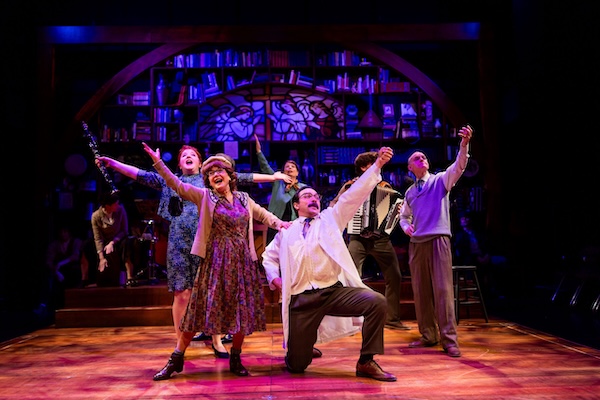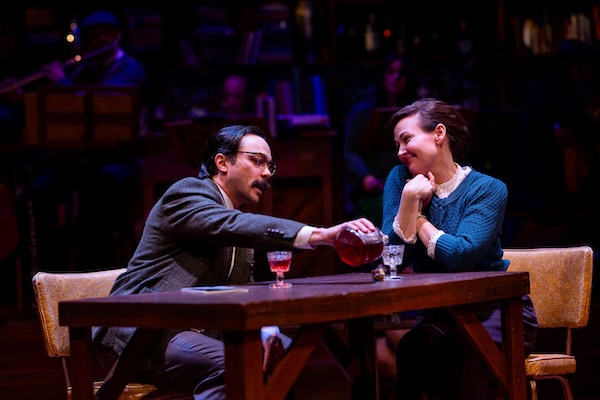Theater Review: “A Man of No Importance” — Love Is a Many Complicated Thing
By Martin B. Copenhaver
A Man of No Importance is a fitting finale to Paul Daigneault’s tenure as artistic director of SpeakEasy Stage Company, serving as a paean to the power of theater both as an artistic expression and as a place to discover community.
A Man of No Importance Book by Terrence McNally. Music by Stephen Flaherty. Lyrics by Lynn Ahrens. Directed by Paul Daigneault. Music direction by Paul S. Katz. Choreography by Ilyse Robbins. Staged by SpeakEasy Stage Company in the Roberts Studio Theatre in the Stanford Calderwood Pavilion at the Boston Center for the Arts, 527 Tremont Street, in Boston’s South End, through March 22.

Eddie Shields and Will McGarrahan in the SpeakEasy Stage Company production of A Man of No Importance. Photo: Nile Scott Studios
It is ironic that the last show Paul Daigneault will direct for the SpeakEasy Stage Company after 33 years as artistic director is a play entitled A Man of No Importance, because Daigneault has been a figure of enormous importance in the Boston theater scene. For his final offering he chose a chamber piece, rather than something on the scale of a grand finale. It turned out to be a good choice, and a fitting finale, indeed.
The creative team that first collaborated on Ragtime in 1996 — Terrence McNally (book), Stephen Flaherty (music), Lynn Ahrens (lyrics) — returned in 2002 with A Man of No Importance (based on the 1994 film starring Albert Finney). The two shows could not be more different. Ragtime is a sprawling spectacle, befitting a play about upstart America at the beginning of the 20th century. By contrast, A Man of No Importance is a small play set in 1964 Dublin; the story plays out on an intimate scale.
The man of no importance of the title is Alfie Byrne (played by Eddie Shields), an unassuming man who loves the poetry of Oscar Wilde, which he recites for the indulgent passengers of the streetcar where he works as a conductor. (And, of course, Wilde’s most famous play is alluded to in the title, as well.) Alfie is also devoted to the local theater company, Saint Imelda’s players, where he directs plays performed in the basement of the neighborhood Catholic church.
Alfie is determined to bring together his great loves by directing Wilde’s play Salome. The play draws from the New Testament story of John the Baptist, but it is dripping with sexual imagery and culminates in Salome’s “Dance of the Seven Veils,” which could be described as a kind of striptease. Not surprisingly, Alfie must deal with resistance from the church authorities, as well as from his players. More than once, he has to protest, “It isn’t filthy. It’s art.”
Alfie does find someone who is willing to play Salome, a pretty young newcomer to the neighborhood he respectfully addresses as “Miss Rice” (played by Rebekah Rae Robles). At first, Alfie’s sister, Lily (played by Aimee Doherty) assumes Alfie has a romantic interest in Miss Rice. In fact, she hopes that is the case because she shares a home with her brother and feels stultified by the arrangement. Can’t he just find a nice girl to marry? She sings: “Pity a woman the burden of life with a brother who’s never been wed. Oh, it’s a blessing our parents are dead!”

Kathy St. George and Sam Simahk (center) with (from left) Meagan Lewis-Michelson, Kerry A. Dowling, Ronan Green, and Billy Meleady in the SpeakEasy Stage Company production of A Man of No Importance. Photo: Nile Scott Studios
The possibility that her brother is gay never occurs to her, or to anyone else for that matter. At such a time and place, the “love that dare not speak its name” was cloaked with thick layers of silence and denial, and everyone is complicit in the conspiracy. In Alfie’s case, the silence is not a cover-up; he has never had a relationship with a man, although he longs to. No wonder, then, that Alfie finds a patron saint in Oscar Wilde, who famously burst out of the closet with flamboyant élan, and in Dublin, no less.
When Archie does take a walk on the Wilde side (sorry), it ends so disastrously that he can no longer conceal his identity as a gay man.
But this is more than a story of gay identity seeking acceptance. In the play there are a number of loves that “dare not speak its name” — a pregnancy out of wedlock, an affair with a married woman. It is a story of a longing for love that is never safely out of the reach of shame and loss. The only love in the show that is proudly declared is offered by an old man, cataloguing the virtues of his deceased wife in song, crowned by “the cuddles Mary gave.” It is a sweet little tune winsomely delivered by Billy Meleady, but one can’t help but wonder if the sweetness is pure only because his wife is no longer alive. For the rest of the characters — that is, for the living — love is a many complicated thing.
Although much of the play revolves around Alfie, it is more of an ensemble piece and the cast is excellent. As Alfie, Eddie Shields is restrained in ways that suit the role and that make his expressions of emotion all the more powerful. Aimee Doherty, as Alfie’s sister Lily Byrne, is a standout. She is able to navigate the swerving emotions of compassion and exasperation toward her brother, and her comic timing is spot-on. The most lyrical voice belongs to Rebekah Rae Robles (Miss Rice). She is also beautiful. The combination makes it easy to see why Alfie is captivated by her. Gratefully, Kathy Saint George (as Kitty) is given at least a brief moment in the spotlight as she gives her own version of “The Dance of the Seven Veils,” which is the most hilarious moment of the evening.
By far the most thankless role is that of Oscar Wilde (played by Will McGarrahan). He appears intermittently in a red velour cape and suit, with an oversized boutonniere, apparently for the sole purpose to deliver one of his famous bons mots (and, in this context, not all that bons, either). It is obvious that Wilde haunts and infuses the play, but it is not clear that he needs to be reified. As it is, whenever he appears on stage he seems more like a boorish party-crasher than an inspiration.

Sam Simahk and Aimee Doherty in the SpeakEasy Stage Company production of A Man of No Importance. Photo: Nile Scott Studios
The score is not particularly memorable, but it supports the show in appropriately gentle ways. I did not expect more. This is not Les Mis, after all. For this production, Daigneault employed a technique previously used by John Doyle in a 2022 staging of A Man of No Importance. In addition to the four-piece pit band, at various points he has the actors play instruments from the wings or on the stage, creating a musical ensemble in addition to the theatrical one.
The scenic and lighting designs are stunning. Upstage is a graceful arching structure of dark wood that spans from floor to ceiling. It evokes a venerable Irish library, the shelves covered with beautifully bound books. Midway through the show, Lily sings with her beau a duet in which they deride books and the ways they have led Alfie astray. (“Books. They’re at the root of it. Books. You know they’re dangerous.”). In the set, however, the books — along with the bric-a-brac, bottles of Jameson whiskey, a stained-glass window depicting the Annunciation, and a portrait of Oscar Wilde — do not look dangerous. They look solid and alluring, as if they beckon to an alternative reality. By striking contrast, the part of the stage where the characters interact is stark and bare, consisting only of wooden chairs and an occasional table. At times the lighting seems to become part of the set, casting shadows in patterns that evoke church windows.
A Man of No Importance is a fitting finale to Daigneault’s tenure as artistic director of SpeakEasy Stage Company, serving as a paean to the power of theater both as an artistic expression and as a place to discover community. As Alfie could attest, theater is a place where you can explore aspects of life that can be more difficult to do off the stage. It is where he ultimately finds acceptance — first from other people in the company and then for himself. In trying to persuade Miss Rice to accept the part of Salome, Alfie sums up his own experience: “It can be beautiful out there, playing a part, losing yourself in another person. Just for once, Miss Rice, being somebody else.” By the end of the play it is clear that, for Alfie, it was in “losing yourself in another person” that he found what he was looking for.
Martin B. Copenhaver, the author of nine books, lives in Cambridge and Woodstock, VT.
Tagged: Aimee Doherty, Eddie Shields, Paul Daigneault, Rebekah Rae Robles
